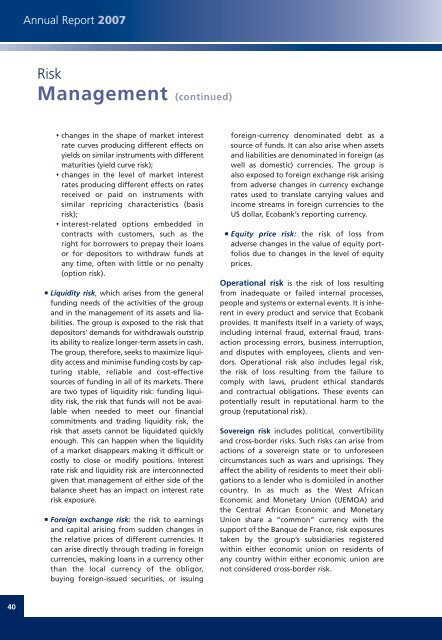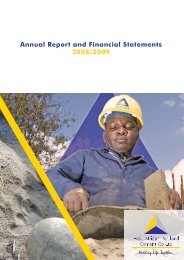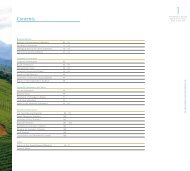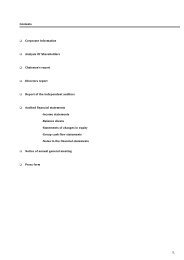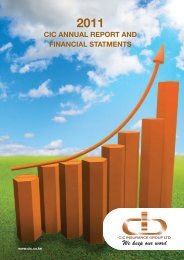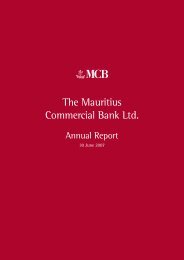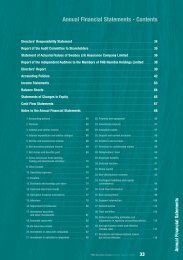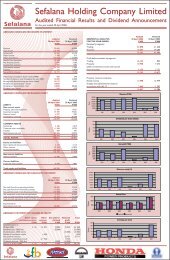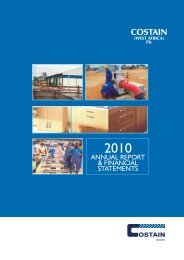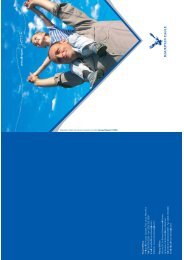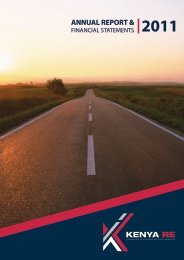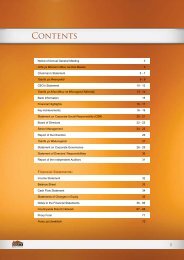Annual Report 2007 - Investing In Africa
Annual Report 2007 - Investing In Africa
Annual Report 2007 - Investing In Africa
Create successful ePaper yourself
Turn your PDF publications into a flip-book with our unique Google optimized e-Paper software.
<strong>Annual</strong> <strong>Report</strong> <strong>2007</strong><br />
Risk<br />
Management (continued)<br />
changes in the shape of market interest<br />
rate curves producing different effects on<br />
yields on similar instruments with different<br />
maturities (yield curve risk);<br />
changes in the level of market interest<br />
rates producing different effects on rates<br />
received or paid on instruments with<br />
similar repricing characteristics (basis<br />
risk);<br />
interest-related options embedded in<br />
contracts with customers, such as the<br />
right for borrowers to prepay their loans<br />
or for depositors to withdraw funds at<br />
any time, often with little or no penalty<br />
(option risk).<br />
Liquidity risk, which arises from the general<br />
funding needs of the activities of the group<br />
and in the management of its assets and liabilities.<br />
The group is exposed to the risk that<br />
depositors’ demands for withdrawals outstrip<br />
its ability to realize longer-term assets in cash.<br />
The group, therefore, seeks to maximize liquidity<br />
access and minimise funding costs by capturing<br />
stable, reliable and cost-effective<br />
sources of funding in all of its markets. There<br />
are two types of liquidity risk: funding liquidity<br />
risk, the risk that funds will not be available<br />
when needed to meet our financial<br />
commitments and trading liquidity risk, the<br />
risk that assets cannot be liquidated quickly<br />
enough. This can happen when the liquidity<br />
of a market disappears making it difficult or<br />
costly to close or modify positions. <strong>In</strong>terest<br />
rate risk and liquidity risk are interconnected<br />
given that management of either side of the<br />
balance sheet has an impact on interest rate<br />
risk exposure.<br />
Foreign exchange risk: the risk to earnings<br />
and capital arising from sudden changes in<br />
the relative prices of different currencies. It<br />
can arise directly through trading in foreign<br />
currencies, making loans in a currency other<br />
than the local currency of the obligor,<br />
buying foreign-issued securities, or issuing<br />
foreign-currency denominated debt as a<br />
source of funds. It can also arise when assets<br />
and liabilities are denominated in foreign (as<br />
well as domestic) currencies. The group is<br />
also exposed to foreign exchange risk arising<br />
from adverse changes in currency exchange<br />
rates used to translate carrying values and<br />
income streams in foreign currencies to the<br />
US dollar, Ecobank’s reporting currency.<br />
Equity price risk: the risk of loss from<br />
adverse changes in the value of equity portfolios<br />
due to changes in the level of equity<br />
prices.<br />
Operational risk is the risk of loss resulting<br />
from inadequate or failed internal processes,<br />
people and systems or external events. It is inherent<br />
in every product and service that Ecobank<br />
provides. It manifests itself in a variety of ways,<br />
including internal fraud, external fraud, transaction<br />
processing errors, business interruption,<br />
and disputes with employees, clients and vendors.<br />
Operational risk also includes legal risk,<br />
the risk of loss resulting from the failure to<br />
comply with laws, prudent ethical standards<br />
and contractual obligations. These events can<br />
potentially result in reputational harm to the<br />
group (reputational risk).<br />
Sovereign risk includes political, convertibility<br />
and cross-border risks. Such risks can arise from<br />
actions of a sovereign state or to unforeseen<br />
circumstances such as wars and uprisings. They<br />
affect the ability of residents to meet their obligations<br />
to a lender who is domiciled in another<br />
country. <strong>In</strong> as much as the West <strong>Africa</strong>n<br />
Economic and Monetary Union (UEMOA) and<br />
the Central <strong>Africa</strong>n Economic and Monetary<br />
Union share a “common” currency with the<br />
support of the Banque de France, risk exposures<br />
taken by the group’s subsidiaries registered<br />
within either economic union on residents of<br />
any country within either economic union are<br />
not considered cross-border risk.<br />
40


